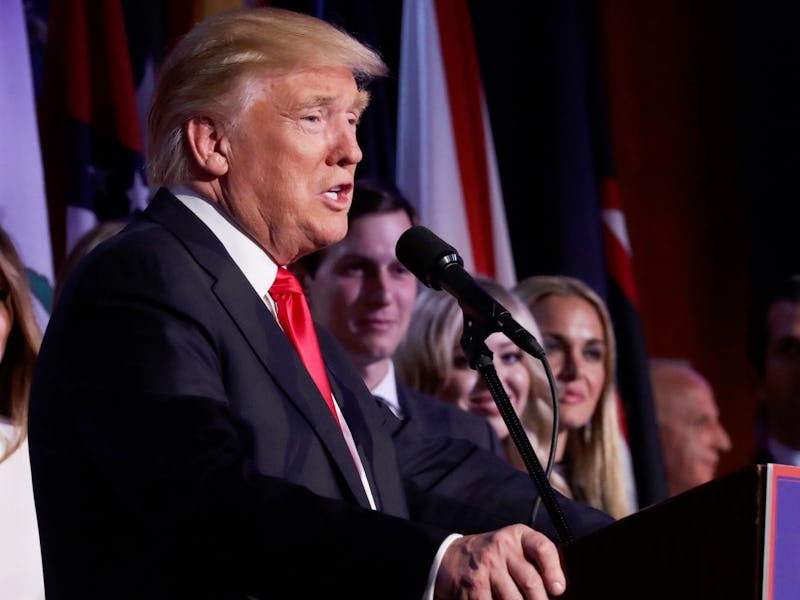When Could Donald Trump Get Impeached?
Impeachment is a complicated process controlled by the House and Senate.

As protests against the election of Donald Trump break out across the United States, Google searches on how to impeach a president have surged. This shouldn’t come as a surprise — people were already discussing how to impeach Donald Trump months before he was elected into office. What is more shocking than people wondering how to impeach Trump is the reality that there’s an actual future where this could happen. The chance of that happening, however, is debatable. While there are foreseeable grounds for a Trump impeachment, a Republican House and Senate isn’t likely to let that happen.
A quick refresher on how the impeachment process works:
1. The Constitution gives members of the House of Representatives the right to impeach the president.
2. The majority of the House have to vote for the charges brought against the president in order for the process to begin.
3. The Senate plays the role of a court — it reviews the charges and the president’s defense, and votes for a conviction.
4. If two-thirds of the Senate votes for a conviction, the president is removed from office and can never hold a position in government again.
This doesn’t mean that the impeached president has to go to jail or pay a fine, for that to happen the case has to be picked up and continued in a civil court.
The likelihood of a Republican House and Senate taking collective action like this against President-elect Donald Trump is slim, meaning that any probable chance of impeachment wouldn’t happen unless the Democrats gain a majority in 2018. When the impeachment process actually happens, it moves fast — in 1999 President Bill Clinton’s impeachment trial began and five weeks later the Senate was deciding whether to remove him from office. In April, Politico theorized a scenario where impeachment whispers began in the summer of 2017, but their prediction was dependent on Republican constituents urging their representatives to take down the president.
Protesters on an onramp watch as police advance toward them in Los Angeles, California.
On what grounds could a president be impeached?
The Constitution lists treason, bribery, and “other high crimes and misdemeanors” as reasons why a president could be a impeached. Treason and bribery are obvious, but definitions for “high crimes and misdemeanors” don’t exist. When he was in Congress, 38th president Gerald Ford said that the “honest answer” to what is an impeachable defense is “whatever a majority of the House of Representatives considers to be sufficiently serious to require the removal of the accused from office.”
Congress decided that tax evasion wasn’t good enough to use as an article of impeachment against President Richard Nixon, so Trump is unlikely to be attacked there. He has said things during the election, like his rejection of NATO and his belief that the Geneva Conventions are a “problem”, that constitutional scholars think could eventually prove as grounds for impeachment. “He’s certainly said things, which if followed through, would constitute high crimes and misdemeanors,” Yale Law School lecturer and military justice expert Eugene Fidell told Politico.
But what is mostly to provide reason for a Trump impeachment is the same reason why Bill Clinton was voted to be impeached and exactly how Trump said he would impeach Hillary Clinton — by being tried for crimes while in office. Unlike any president-elect before, Trump is facing a class-action case before he is even inaugurated. On November 28, the first of several suits over Trump University begins, a civil case where Trump University students claim the school defrauded consumers and the elderly. The next case, which has not been scheduled, accuses Trump University of federal racketeering. But that’s not the end of it — New York state is investigating Trump Foundation, there’s a reported federal investigation of his advisers’ ties to Russia, and several women have stated their intent of bringing him to court for sexual impropriety. The American Civil Liberties Union has already said that it plans on bringing him to court, should he follow through with any “unconstitutional campaign promises.”
Losing any of these cases could be argued as “high crimes and misdemeanors” but the opportunity for an impeachable offense goes further: Bill Clinton was charged with providing “perjurious, false and misleading testimony” in a civil case and of obstructing justice by delaying and concealing evidence related to his trial. Should Trump do the same, these actions could also be used against him.
Choosing to impeach a president is a serious endeavor. When a president is impeached, it disembodies the apparent will of the American people and threatens a very real idea of democracy. There’s a reason why President Barack Obama and Hillary Clinton called for a the peaceful transition of power. But for an impeachment to happen, Yale Law professor Charles Black writes in Impeachment: A Handbook that a president should only be impeached for “serious assaults on the integrity of the process of government.”
The American people will have to see whether or not Trump’s presidency will end up being dangerous to public order. Another thing to consider: If the House and Senate impeach Trump, that means the American people are still left with Mike Pence.